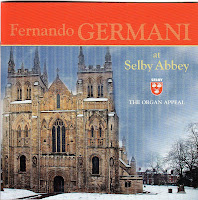Germani came to prominence via a series of recordings made for HMV in the late 1940's and early 1950's In 1961 he came to Yorkshire to record a recital programme of bit romantic piece by Liszt, Franck, Widor and Reger; the disc was issued in 1962 and attracted great interest. It was the first organ disc to feature on EMI's official list of best sellers, remaining there for 18 months. Germani followed this up with two further discs from Selby, one devoted to Franck and one to Frescobaldi. The present CD selects music from all three.
Germani was a great advocate of the music of Frescobaldi. Here he plays four pieces, two toccatas, a canzona and capriccio pastorale. Don't expect anything authentic, this is a big romantic view of Frescobaldi but still expressive in its way and perhaps with a great deal more flexibility of tempo than would be accorded the music today. But the performances are wonderfully convincing, I certainly did not sit fretting about the historically informed performance details.
Whilst my preference for Cesar Franck's organ music would be a French instrument by Cavaille Coll, Germani shows how versatile the Selby instrument is and conjures wonderful textures in the first and third chorals. The first starts in a hushed manner but raises the roof at the end. In the second Germani displays his dazzling fingerwork. In the CD notes, he is compared to his compatriot, the pianist Michelangeli, and the comparison is apt.
Franck wrote his Trois Chorals for organ in 1890 shortly before his death, a produce of his late Indian Summer which started with the Piano Quintet in 1879. Despite their titles, the chorals are not small works, each lasting nearly 15 minutes in Germani's performance. After listening to Germani's performances of the first and third chorals I could not help wishing that we could have heard number two as well.
Liszt's Prelude and Fugue on BACH, one of his few works for organ, was written in 1847 though Germani plays the revised 1870 version. His performance is one of a dazzling virtuoso with playing that is both technically superb, characterful and impulsive. He brings out the unconventional nature of the fugue, with its dark mysterious moments. The result is brilliant but subtle and using the organ to its capacity.
Max Reger's Fantasia on the Chorale Halleluja! Gott zu Loben starts with a big, grand opening gesture full of flurries of notes from hands and geet, followed by a fantasia of predominantly fast brilliance. The fugue, by contrast, is rather a perky jolly affair, rising to a strong climax, and far more traditional in structure than Liszt's tonally challenged music. The work is one of three that Reger wrote in 10 days in September 1900. The Fantasia is in fact one of Reger's most optimistic works.
Widor was professor of organ and composition at the Paris Conservatory and organist at St. Sulpice. His Fifth Organ Symphony was written in 1879. The toccata is perhaps Widor's best known work, taking on a remarkable life of its own. Germani's performance is characterful and crisply impulsive rather than grand, displaying a lively personality.
The CD booklet includes a memoir of Germani by Nicholas Kynaston written in the year of Germani's death, notes about the music as well as photographs and information about the organ and its restoration.
Throughout all these recordings you get a strong sense of how much Germani was a virtuoso of the organ keyboard. The CD booklet refers to his recordings as inspiring a generation of organists, and you can understand why.
Whilst the CD is available from Amazon, if you are interested then please buy it direct from the appeal website, where you can also hear a sample of Germani's playing.
Girolamo Frescobaldi (1583 - 1643) - Toccata I (T.1.) [4.21]
Girolamo Frescobaldi (1583 - 1643) - Canzona IV (T.2.) [3.54]
Girolamo Frescobaldi (1583 - 1643) - Toccata V (T.2.) [3.34]
Girolamo Frescobaldi (1583 - 1643) - Capriccio Pastorale (T.1.) [3.27]
Cesar Franck (1822 - 1890) - Choral No. 1 in E Major (1890) [14.40]
Cesar Franck (1822 - 1890) - Choral No. 2 in A Minor (1890) [14.43]
Franz Liszt (1811 - 1886) - Prelude and Fugue on BACH (1847/1870) [13.26]
Max Reger (1873 - 1916) - Fantasia on the Chorale Halleluja! Gott zu Loben (1900) [13.18]
Charles-Marie Widor (1844 - 1937) - Toccata from Symphony No 5 in F minur OP. 42 No. 1 (1879) [5.07]
Fernando Germani (organ)
Recorded circa 1962 in Selby Abbey, Yorkshire
SELBY ABBEY ORGAN APPEAL SAOA001b 1CD [71.56]
Elsewhere on this blog:
- Vivid Comedy - Cimarosa's The Secret Marriage with British Youth Opera
- Fine ensemble - Britten's Paul Bunyan with British Youth Opera
- Lise Lindstrom as Turandot at Covent Garden
- Light over Earth - Daniel Bjarnason - CD review
- Fun and imagination - Co-Opera Co's The Mikado
- A Bold Experiment - Sinfonia Cymru UnButtoned
- A Grand Night for Singing - Co-Opera Co at Hackney Empire
- Heaven Indeed - Monteverdi from the King's Consort - CD review
- Vividly involving - Co-Opera Co's Madama Butterfly
- England's Finest - Sarah Connolly and Tenebrae
- Fascinating synthesis - Rakasha - CD review
- Opera alfresco - Ana Maria Martinez Live by the Lake
- Home












No comments:
Post a Comment